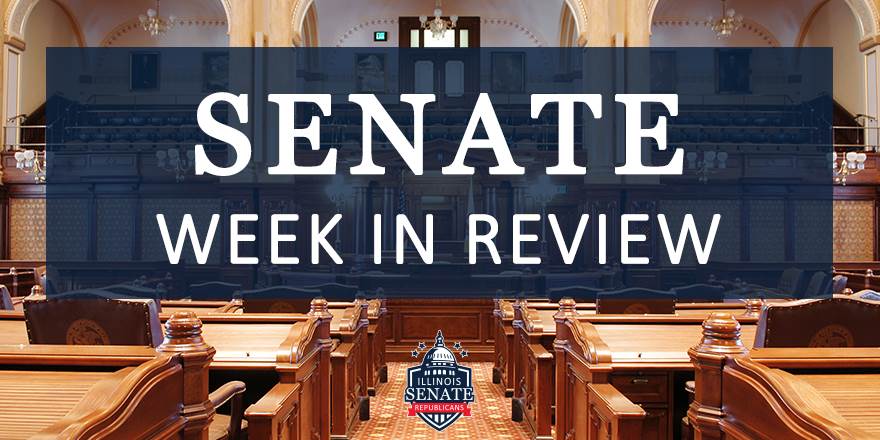
SPRINGFIELD – It has been one week since the Illinois General Assembly approved a Fiscal Year (FY) 2024 budget plan, and questions remain on whether it is truly balanced.
In other news, the Illinois Office of the Auditor General has recently released an audit of the Business Interruption Grant (BIG) program, which found several failures with the $585 million initiative.
This year, Illinois’ wheat production stands to significantly increase from last year’s record, coming at an advantageous time as Illinois has also an increased amount of wheat planted. With anticipated numbers, Illinois could move from the sixth-ranking wheat producer in the United States to the fourth.
And the Illinois Conservation Foundation (ICF) has opened nominations for the 2023 Illinois Outdoor Hall of Fame, to recognize people involved significantly in promoting outdoor events.
Illinois Budget Plan Likely Contains Hidden Spending

One week after the General Assembly passed the FY 2024 spending plan, questions remain about whether the budget will truly be balanced at the year’s end. State Sen. Jil Tracy (R-Quincy) pointed to hidden spending found throughout the budget that could put the state’s spending well over expected revenues.
One example of possible “phantom” spending in this year’s budget, which also served as a major point of contention during negotiations, is a program solely funded by Illinois taxpayers that provides free healthcare to undocumented immigrants. Illinois is currently the only state in the nation to provide this level of healthcare to noncitizens ages 42 and older.
During budget hearings throughout the year, the Governor’s Administration provided a cost estimate of the program at a whopping $1.1 billion. Despite knowing this estimate, the Majority Party only allocated $550 million to the program in the budget—just half of what it is expected to cost taxpayers. While Democrats claim that they also provided the Governor with rule-making authority to rein in the ballooning program, Sen. Tracy said it is difficult to believe that a rule change will be able to reduce the costs by $550 million, especially after the Governor and the Majority Party have made it clear they would not be willing to cut existing enrollees from the program.
Another example of hidden spending is the anticipation of a new AFSCME contract, which the Governor is expected to agree to, at an additional cost of hundreds of millions of dollars. Funding for this new contract for thousands of state employees was conveniently left out of the budget, said Sen. Tracy.
With just a $100 million surplus in the legislatively approved FY 2024 budget plan, Sen. Tracy said it is doubtful that the minimal surplus will be enough to cover the true costs of the state.
The FY 2024 budget has been touted throughout the week by the Governor, but still awaits his signature.
Audit Slams State’s Handling of COVID Relief Money

In 2020, the Governor announced the Business Interruption Grant (BIG) program. Operated by the Illinois Department of Commerce and Economic Opportunity (DCEO), the program used federal tax revenue to give $585 million in grants to businesses to provide relief from the COVID-19 pandemic. In a recent audit of the program, the Illinois Office of the Auditor General found that the spending “failed to work as advertised” and that the program itself had insufficient oversight.
One of the key failures of the program was the DCEO’s inability to provide documentation of the Round 1 selection process for recipients of the grants. This implication is worsened by another finding that multiple administrators did not comply with conflict-of-interest policies. With the fairness of the awarded grants being called into question, additional findings—that $3.42 million was awarded to ineligible applicants and the program failed to verify with businesses their compliance to the program’s rules—show serious flaws with the execution of the program.
Alongside these findings, the Auditor General’s report makes 15 recommendations to the DCEO for future grant programs, including directing them to develop and maintain proper documentation on how the program selects grant administrators, develops administrative rules, checks for accuracy of applications, and complies with state statute.
Illinois Wheat Production Sets Records
While some wheat producers across the United States have been feeling the effects of hot weather, the Illinois Wheat Association’s recent crop tour showed that Illinois wheat yields are breaking records. Accordingly, the average wheat yields were estimated by the Illinois Wheat Association at approximately 97 bushels per acre, significantly higher than Illinois’ 79 bushels per acre recorded from last year.
This increased return on wheat comes at an advantageous time, as a combined one million additional acres of wheat have been planted throughout the Midwest. Brought on by the disruption of global grain shipments due to the Ukraine invasion, the United States Department of Agriculture expanded insurance coverage for farmers raising two crops on the same land to attempt to boost production. As such, the number of total acres planted is up 41 percent from last year.
This jump might leave Illinois moving from the sixth ranking wheat producer in the United States to the fourth. Currently, if predictions remain on track, Illinois stands to have the largest wheat crop since 2008.
Illinois Outdoor Hall of Fame Nominations Are Open
Since 2002, the Illinois Conservation Foundation (ICF) has hosted nominations and selections for the Illinois Outdoor Hall of Fame. These nominations include outdoor sportsmen and women, conservationists, or preservationists who have made significant contributions or exhibited dedication in preserving, promoting, enhancing, or supporting natural resources or outdoor recreational opportunities.
The number of inductees varies, but historically no more than five have been selected each year. After being selected, the honorees are invited to the annual Hall of Fame Gala.
Nominations are currently open and will close July 14. All nomination applications are to be submitted by email in PDF form. Mail-in applications will not be accepted. More information on the application process can be found on ICF’s website.
